the attack on titan musical made broadway c*nt again
the sold-out musical brought Comic Con-level fanfare to Broadway for one weekend
welcome to strong feelings! Essays by writers we love, in which they share their most impassioned opinions on a given subject. In today’s strong feelings, Gita Jackson (they/them), writer & co-founder of the independent internet-culture site Aftermath reviews the sold-out Attack on Titan musical in NYC.
As the cast of Attack on Titan: The Musical took their final bows I became very sure of two things: One, Attack on Titan might be one of the most important fictional works of the twenty-first century. Two, it is — perhaps unexpectedly — perfect material for a musical, which I got the chance to see proven during its one-weekend run at New York City Center.
At the Saturday matinee, the fanfare was unlike anything I’d seen on Broadway before. Many attendees arrived in cosplay, clad in near-identical replicas of the cropped jackets worn by the Survey Corp in the anime. The energy in the theater felt more like a K-pop concert than the beginning of a musical. Fans screamed when their favorite characters walked (or flew) on stage and gasped when they saw the titans (giant, man-eating humanoids) come to life in the form of giant balloons manned by four different stagehands.
Lovers of the anime might be surprised that such a fantastical world would be adapted to the stage, but anime adaptations of musicals are actually fairly common in Japan. These adaptations have been dubbed “2.5-Dimensional” by director Makoto Matsuda in 2014 when he formed the 2.5D Musical Association, (duly named, because they are taking a two dimensional property and, as you may have guessed, adding new dimensions to it). Matsuda directed Prince of Tennis: The Musical in 2003, and since then there have been acclaimed adaptations of series like Naruto, Yowamushi Pedal, and Haikyu!. Until this past weekend, I’d never had the chance to see one in person, (though I’ll admit I secretly pirated recordings of the all-female Sailor Moon musicals on the family computer as a teenager).
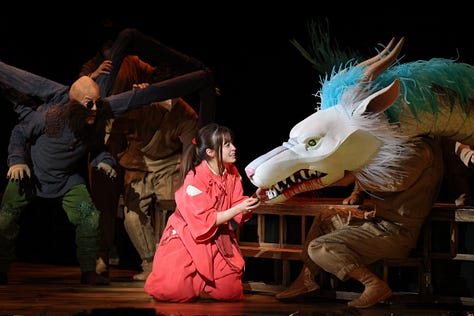
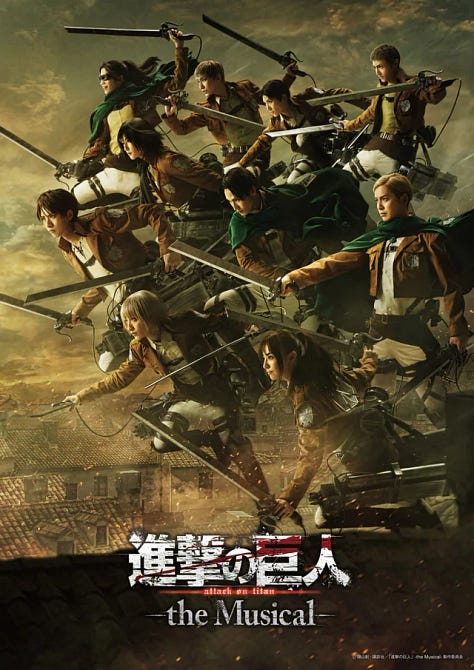
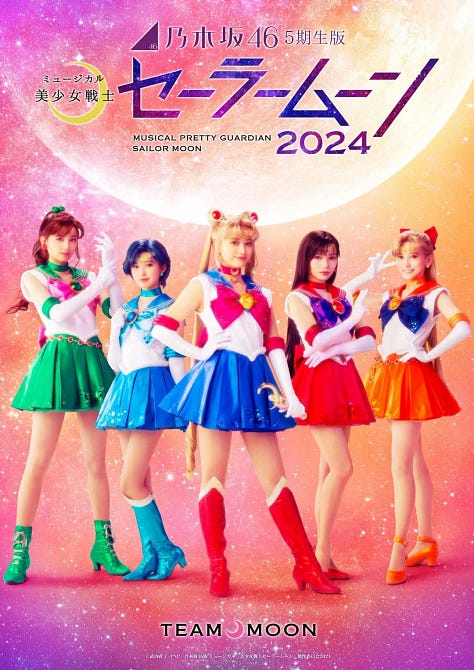
There have been attempts to bring 2.5D productions overseas before, with mixed success. In 2019, Pretty Guardian Sailor Moon had three sold-out performances at the PlayStation Theater in New York, and last year, Ghibli’s Spirited Away traveled from Tokyo to New York before it finally landed on HBO Max for fans to stream. When the English translation of the Your Lie In April musical was slated to run for two months in London’s West End, it ended early due to poor ticket sales. Again, Attack on Titan might have sounded like a strange fit, but to my surprise and delight, it was a thrilling show, perfectly suited for live theater, and delightfully bolstered by its devoted fanbase.
But first, some background for the uninitiated: Attack on Titan is a landmark anime — one of the first to reach mainstream popularity in America. Premiering in 2013 on Crunchyroll, an anime streaming service, the show reached such heights of popularity that the manga’s author, Hajime Isayama, was interviewed in the New York Times when the series finally ended seven years later. When I first saw the show, I was blown away. I’ve been an anime fan since my older brother taught me how to download shows from IRC — an ancient, early peer-to-peer network — but Attack on Titan’s intoxicating mystery box of a world was something I couldn’t tear away from. Despite the controversial ending of the series, it remains a seminal work, and is a lot of people’s first anime they’ve ever watched.
“When I first started this series, I was worried that it would probably be canceled,” Isayama told the New York Times. “It was a work that no one knew about. But I had already started the story with the ending in mind. And the story ended up being read and watched by an incredible number of people…”
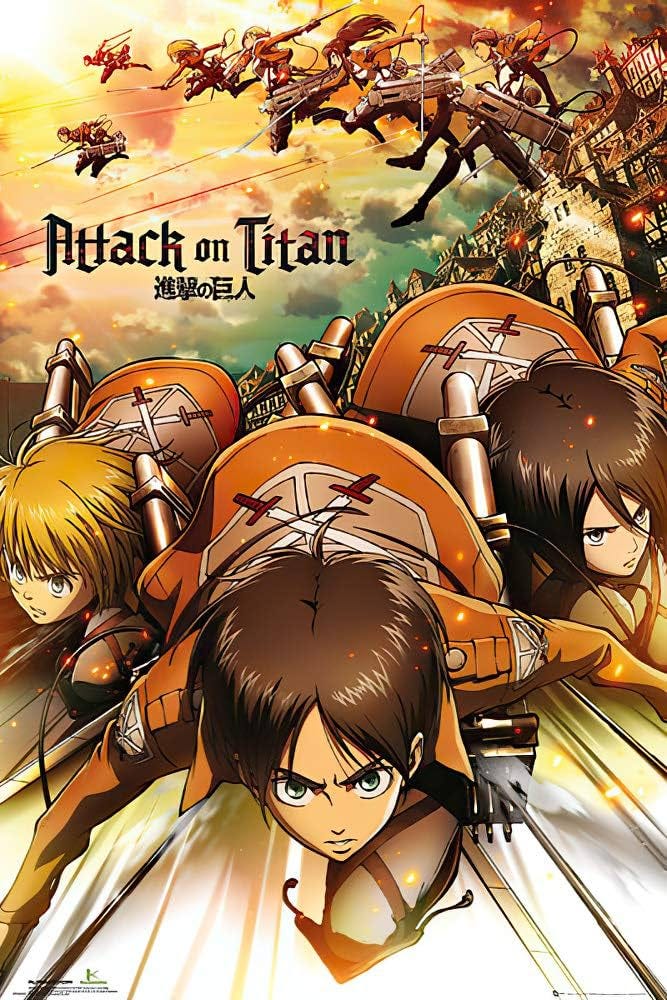

Taking place in a fantasy world where humans live inside a walled city, besieged by giant humanoid monsters called “titans” outside the walls, Attack on Titan is the story of Eren Jaeger’s desire for freedom and revenge. After the titans breach the walls and kill his mother, Eren swears to join the military and kill every last titan on the planet. Attack on Titan: The Musical re-tells the beginning of the story, where Eren and his friends train to master the twin blades and omni-directional gear that allow them to kill titans. In time, Eren discovers that he has a unique power to turn into a deadly titan himself.
Attack on Titan is a show whose calling card is its brutal violence. As fans learn early on, basically any character can, and will, die, often horrifically. My first reaction to hearing that it’s been adapted to a musical was disbelief—how would they portray all the fights and human beings ripped into pieces? What is there to sing about, anyway? I’m happy to say that I was completely wrong.
Attack on Titan is, at its core, about people who are driven by passion. The heightened emotions and melodrama are what make the show work on stage and what propels the music. When you’re in the room with the actors, everything melts away except their desire for freedom.
During our interview, Attack on Titan: The Musical director Go Ueki explained that in a 2.5D musical, characters don’t just sing to move the plot along, or because their emotions are so great that they just have to burst into song. “When it comes to 2.5D musical, the fans expect certain things from the character,” he said. “At the end of the song, at the end of the dance, fans need to feel like…that's what I expected from the character.”
In fact, Ueki said that while adapting the show, they changed one sequence from dialogue to a song, because it was such an iconic scene for the character: “The scene with Hange was actually not a song when we started out,” he said. As fans of Attack on Titan know, Hange is a fanatic for titans, whose passion is learning what makes these giant monsters tick. In the musical, she sits down with the new cadets to introduce them to titan biology, dancing across the stage as she does so. It works because Hange is a Ms. Frizzle-if-she slayed-…titans-…type character, and seeing her burst into song talking about the titans history felt character-right.
I found myself moved all over again by watching Eren and his comrades struggle against immense odds. And they do feel immense. The titans are portrayed in a few very effective ways—by using projections on a scrim with which actors interact, with a giant balloon to represent the impossibly huge “Colossal Titan,” and with two massive puppets that are operated by stagehands. Each new appearance of a titan felt shocking. I could hear the audience gasp — and then applaud — when the Colossal Titan was shown for the first time.
It was also an incredibly athletic show, with actors flying around the stage in harnesses to interact with and battle the titans. Ueki, who has a background in breakdancing, hand-picked dancers that he’s worked with over the years to perform in the show, and they often broke out in acrobatic stunts. One even spun on his head for, I swear to god, two minutes straight. Being in the room with all the screaming fans as I watched these beloved characters come to life was overwhelming—the two-hour runtime passed in the blink of an eye.
Broadway has been trying to attract younger audiences for years, and while there is some interest from Gen Z, it’s happening by degrees. According to Broadway League’s yearly survey, the average age of Broadway theatergoers is 40.4. If I had to take a guess, the average age of the audience for Attack on Titan: The Musical was much younger. One 20-year-old fan we spoke to, Ciel, travelled from Chicago to NYC just to see the show.
What I think attracts people to this show isn’t just that it’s an adaptation of a work that appeals to a younger audience, but also because it’s a show that engages with the anxieties of young people. This adaptation puts the focus on the themes that made the anime such a hit in the first place: What does it mean to be “free”? Don’t we all deserve a life outside of a birdcage, even if that comes with danger?
“The original author, Hajime Isayama, grew up in a very small village and rural area, and he told me that it felt really shut in, he felt like he was surrounded by walls,” Ueki told me through an interpreter. “He wanted to break through it all, and that's the kind of feeling that he poured into this story. All the songs that you hear in the musical, it's the cry of the heart, his heart, and all of our hearts that feel the same way…That's how I got to the theme of wanting to break through — the passion for a future and something new.”
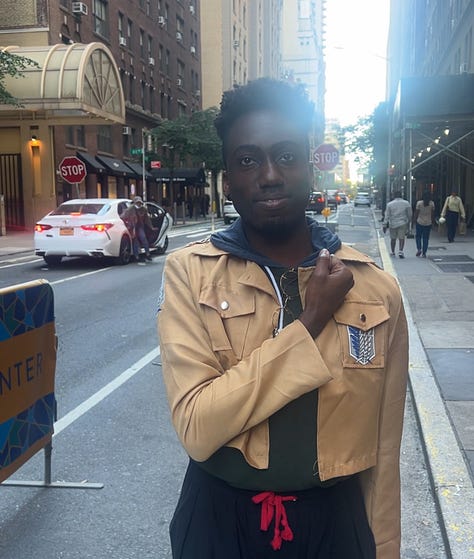
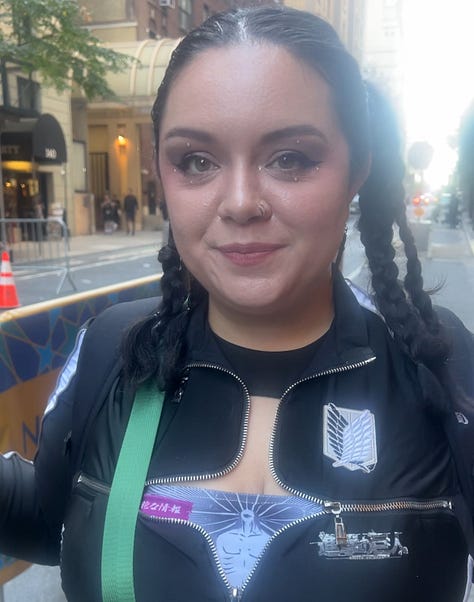
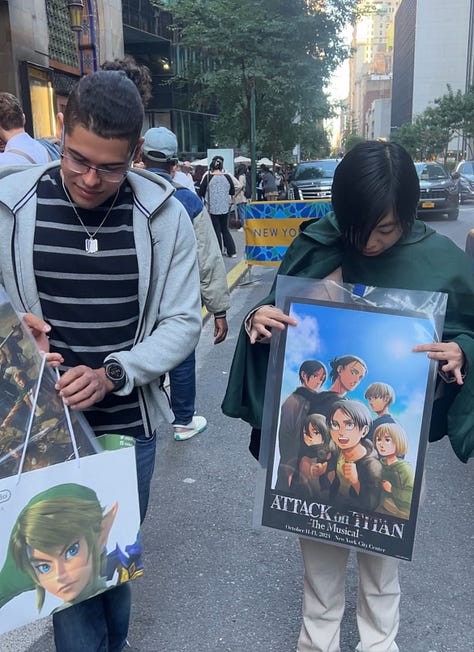
Attack on Titan: The Musical brought a new kind of fandom to Broadway. The energy in the theater was electric, even before the performance. The musical ran for just one weekend in October, but sold out all but a handful of tickets in the spring when the show was announced. I tried to buy one of the t-shirts commemorating the show, but they had all sold out on opening night (I settled for two standees, which were blind boxes — I wanted Levi Ackerman but ended up with Erwin Smith and Marco Bott).
Chris Gbogi, who is one of the co-founders of the group Anime Social Nexus, organized a group of fans to attend the musical together. He said that this was the first musical he’s ever seen, anime or otherwise, and that after seeing this one, he would definitely go to more.
“I'm here for anything anime. As long as they keep making anime things, I'll be here. But, oh, they did it really well,” he said. “I didn't know how they were gonna do the Colossal Titan…They did a really good job in trying to make it as real as possible, but also still be a musical.”
But what makes Attack on Titan truly a perfect musical are the complicated questions it poses — and the fanbase that has identified with the cry for freedom that the show represents. This is what makes Attack on Titan so appealing to young people. As fascist thought rises across the world, we have to ask ourselves what being free really means, and how much you’d give up for that freedom.
“Anime and manga saved me growing up,” Ryo Matsuda, the actor who portrayed my favorite character, Levi Ackerman, said during the press preview. “To bear this wing of freedom on my back, I hope that it helps us go beyond the borders and reach throughout the world.”
The musical ends at the end of the training arc, where Eren and his comrades are preparing to launch the first attack on the titans that humanity has ever seen. I couldn’t help but think about the war in Gaza as I watched it, as the ensemble sang about their fear and subjugation, living their lives inside a cage with no hope. Every day, I see horrific images from Gaza of Palestinian children dead in their parents’ arms, burning to death in hospitals, children mourning their parents with heart shattering cries of grief. The question of “how far would you go for freedom?” has never been more relevant.
Samar, a fan who is from Gaza, said that watching the show brought up feelings about Palestine and the conditions there.
“I started watching the first episode and then I was watching an episode every week,” Samar said. “I remember the episodes exactly when the three of them were dreaming about going outside. I was in Gaza, and Gaza is also locked and they have a siege. That was my dream, [too]. A lot of feelings, really, Attack on Titan brings to me. It felt like Gaza, the feelings they brought up. It felt the same.”
As Eren proclaims, life inside a cage waiting for death is hardly a life at all—every human being on this planet deserves more than that. Eren Jaeger, Levi Ackerman and all their comrades give everything they have because they want to live free; if nothing else, I’ll hold that in my heart until the day I die.
“I'm very happy, extremely happy with the reaction of the New York audience. And really, we're really, really, really grateful,” Ueki told me. “This shows the power that art and performing arts has. It can be stronger than any weapons that there is.”



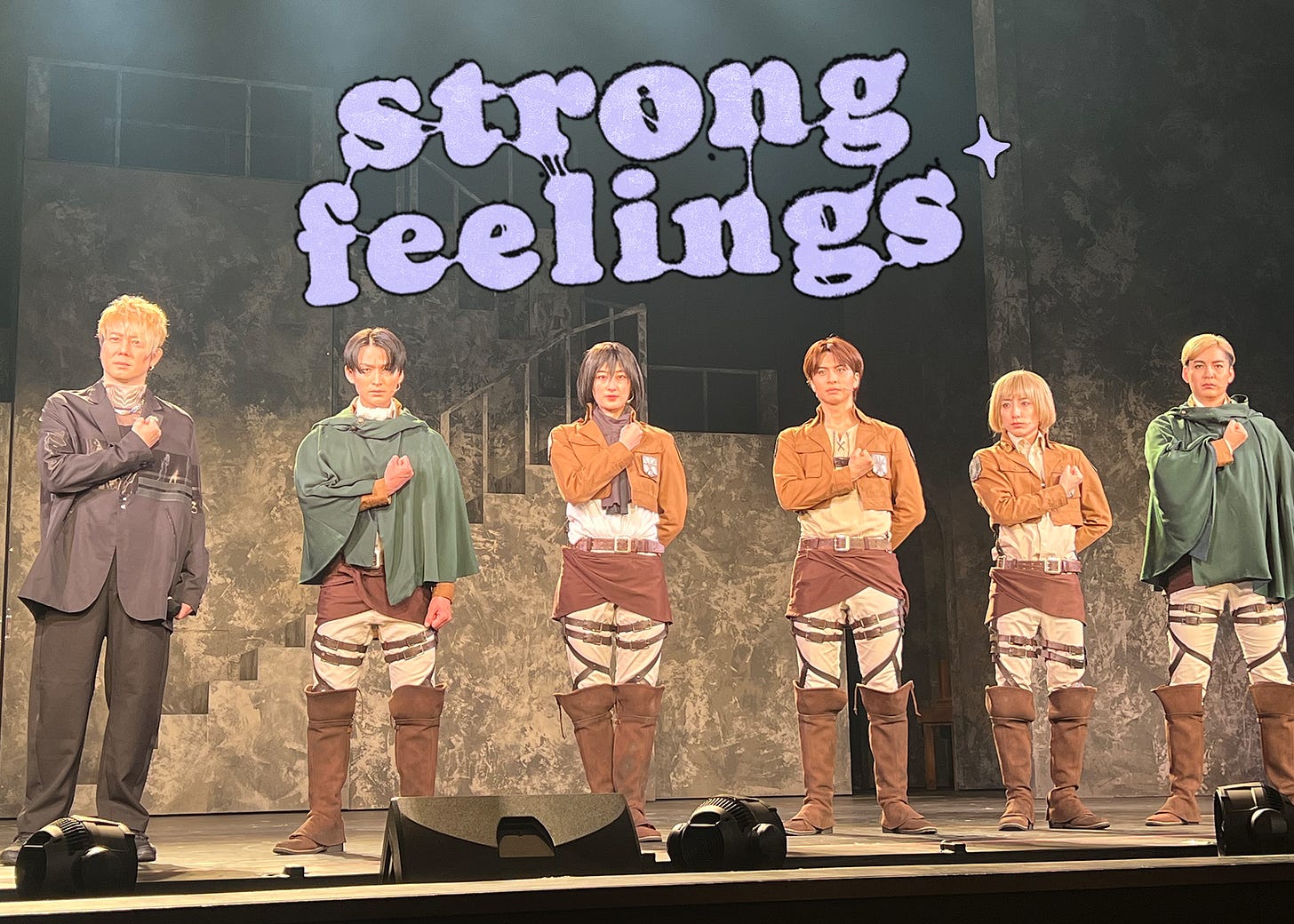
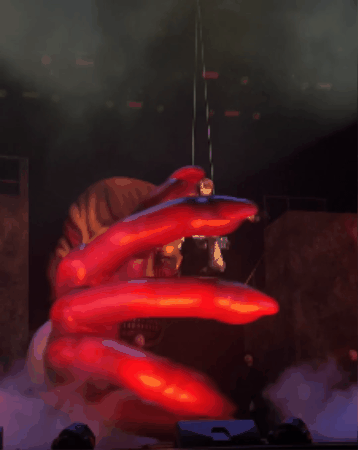
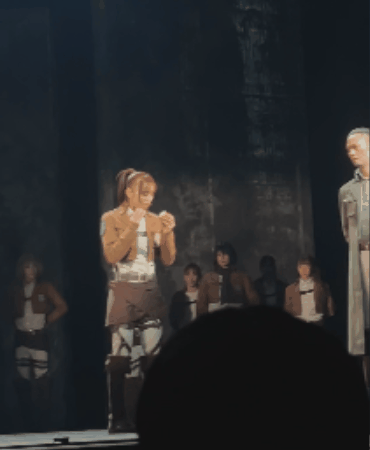

Nice review...but Hange is not "she/her".
Hange is an officially a non-binary "they" according to the publisher and author.
https://kodanshacomics.tumblr.com/post/73207971230/hello-i-wanted-to-ask-you-guys-a-question-about
Their character is based on a few Japanese men: an eccentric boy from his hometown, a well-known movie critic who loves "manly" films, and a transvestite gay tv star.